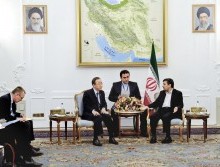The report from The New York Times claiming that the US and Iran had reached a preliminary arrangement to hold direct nuclear negotiations after the US election certainly carried with it an air of authenticity. But the many denials since make one wonder if the deal will go anywhere, if it ever was in place to being with. In reality, it looks to be a classic case of diplomatic-speak.
The report from The New York Times was entitled “U.S. Officials Say Iran Has Agreed to Nuclear Talks,” but now one wonders if the bold report went too far. NBC has since said that the sides are talking, but Iran has not yet agreed to a meeting.
The New York Times itself in the report quoted White House spokesman Tommy Vietor as saying, “It’s not true that the United States and Iran have agreed to one-on-one talks or any meeting after the American elections,” although the US was willing to do so. Iran denied the report as well, and Israel has denied knowledge of the discussions between the sides.
So what happened? How could the Times, a respected newspaper, get US officials saying opposite things?
Basically, the NBC report looks to be the most technically accurate—the US is probably talking to Iran, but there’s no final deal yet. That doesn’t mean there isn’t a preliminary openness to a deal. In diplomacy, there’s a fine line between unofficial, private talks and negotiations. The New York Times got it right: The US and Iran have agreed to talk—they already are.
But it’s not the big thing and all the details are so sketchy there’s no arranged meeting between the sides. The Times is quite possibly correct that the sides are willing to talk one-on-one. But again, with no date, no agreed-upon discussion topics and not even a settled US negotiating stance, one can just as easily say that no meeting has been agreed upon.
It’s public diplomacy in all its glory: verbal legalese that enables either side of a report to be technically true. This gives a PR boost to the Obama administration amidst fears that the Iran diplomacy is going nowhere. But it also gives plausible deniability if these talks go nowhere too.
Most importantly, it leaks the idea publicly and then denies it in such a way as to keep secret talks just that—secret. If someone opposed to the discussions was prepared to spill the beans, preempting that with a technically-true leak and then a technically-true denial is one way to misdirect the media reports.
In other words, NBC is right, no final deal is reached. But it looks like one is a lot closer than it may appear, and The Times could be right that the sides are open to it.
So is this a good thing? Only if Iran is a lot more open in private than in public. The New York Times report said US officials were discussing how to handle Iran’s nuclear fuel enrichment, perhaps allowing some monitored enrichment to continue.
But Israeli Prime Minister Benjamin Netanyahu has it best: No enrichment should be allowed. Certainly not if the underground Fordo enrichment plant is kept running.
Iran is too close to a nuclear weapon. And it’s also obviously under enormous pressure to consider talks with the US.
Why stop now? Why give Iran relief from sanctions without reaching a deal that prevents Iran from making any progress towards weapons? A deal that only delays the threat another few years isn’t worth the risk if it gives Iran opportunity to secretly progress its program or better position itself to run toward weapons later.
Enrichment isn’t the only concern here. Allowing a domestic program also enables Iran to improve the enrichment process, making dangerous progress easier in the long run. There’s still time for diplomacy, and that means there’s still time to do it right.
This is the world’s best chance to stop a war and stop Iran’s nuclear program. Don’t jump the nuclear gun. You don’t want to end up in front of it in case it goes off.
(By Joshua Spurlock, www.themideastupdate.com, October 21, 2012)

